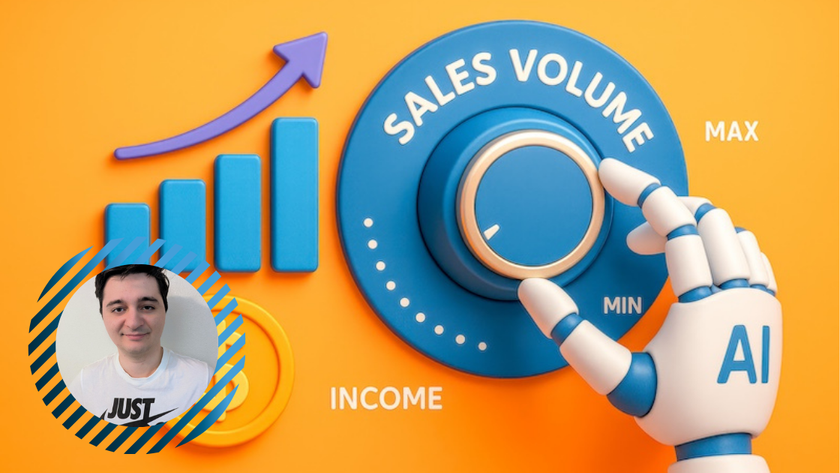The world of sales is dramatically changing, with demand for greater speed and immediate decision-making rendering traditional approaches obsolete. Traditional sales and marketing methods lead to a shocking $2 trillion in wasted costs and lost revenue potential, meaning sales leaders and CROs are under mounting pressure to not only boost the bottom line and secure better and bigger results, but to do so swiftly.
Enter artificial intelligence (AI), which is being more widely adopted by companies across multiple areas, including sales operations. AI tools are helping sales teams make rapid and reflexive decisions and improve workflow efficiencies, imperative ingredients to maintaining a competitive advantage in today’s landscape. According to McKinsey insights, AI adoption is paying off: companies that have adopted new technologies, including AI, are consistently driving their sales teams’ efficiency up by 15%.
However, there is a catch. AI tools aren’t something that can just be integrated into a digital ecosystem and left to their own devices. They require careful oversight, which includes understanding what good data management looks like, potential security risks, and fine-tuning models. And these skills no longer only sit in the IT department: Sales leaders also need to know how to manage AI.
New Responsibilities
Sales leaders’ roles have always been people- and profit-centric. Those priorities aren’t going anywhere, but there is a new one that needs to be on their radar: technology. The most successful and adept CROs and heads of sales are technologists in addition to strategists.
They’re making sure any integrated AI tools are meeting KPIs and fueling pipeline revenue, keeping a finger on the pulse of their performance and reliability.
AI is being more widely deployed in repetitive tasks such as:
- Qualifying and scoring leads
- Generating emails and personalized messages at scale
- Automating follow-ups and summarizing meetings.
- Forecast sales revenue and potential ROI via predictive analytics.
Particularly with the last scenario, there’s a lot at stake in leveraging AI, and when failures occur, it’s never the technology that’s to blame, but the team.
As leaders, sales heads and CROs have a duty to their teams, clients, and organizations to ensure these technologies are deployed securely and ethically and meet or even exceed performance expectations. Ultimately, they need to act as AI custodians, which requires certain skills and know-how that most don’t currently possess.
The Three Skills for AI Success
There is a business and professional imperative for sales leaders to know what they should be looking out for when applying AI to their workflows and how to effectively manage it. Sales leaders must learn how to coach and manage their AI stacks if they want to ensure long-term scalability and ROI on these tools.
There are three skills in particular to brush up on to achieve this: Prompt design, model training, and data literacy. All three areas will soon become core leadership capabilities.
A reliable sales leader would never assign a team member to a project without a detailed brief. In the same token, we can’t expect reliable performance from AI fed with poor prompts. When it comes to AI, what you give is what you get; a strong prompt will lead to a strong output. The best way to approach prompt design is to consider it another communication skill to hone, except you’re talking with a machine, not a person.
Sales leaders need to be well-versed in the following:
- Designing prompts that align with team objectives and tone.
- Testing and refining prompts for optimal results.
- Familiarizing team members with the different kinds of prompts, such as contextual, instruction-based, and zero-shot prompts.
- Instructing reps on using prompt templates in real-life situations.
Continuous Fine-tuning
Setting out a playbook with key objectives and a clearly defined tone for content generation is a useful starting point for establishing excellent prompt design. Creating prompt templates for specific tasks and workflows for sales reps to have on hand can be incredibly useful for daily AI use.
Next, AI models aren’t static. They need to be continuously fine-tuned and trained in order to perform optimally. That’s not to say sales leaders should turn into data scientists to train AI, but they should have a firm grasp on:
- The data types that are best suited for sales strategies and goals.
- When to retrain and test models alongside strategy changes.
- Collaborating with operations and IT teams to customize AI outputs in line with sales strategies.
Clean Data
Finally, the most resilient leadership has strong data literacy skills. Data is the beating heart of AI, and individuals who aren’t familiar with effective data management are just as vulnerable to errors as the AI tools themselves. The crucial difference is, however, that the weight of a failure sits on the leader’s shoulders, not the AI’s.
Poorly managed data leads to biases, hallucinations, security breaches, and abuse of sensitive information, which are risks that can end up costing businesses millions of dollars. So, sales leaders must familiarize themselves with:
- Effectively mitigating risks of bias and hallucinations through properly managed data.
- Cleaning data so there are no duplicates, interoperability issues, formatting problems, or gaps.
- Auditing AI processes to ensure transparency and proper data handling.
- Data regulations, such as the GDPR.
Winning with AI means properly overseeing it, much like you would a member of your sales team. The most resilient and agile sales leaders of tomorrow are adopting essential new skills for managing and coaching AI, not just taking a ‘plug and play’ approach to these tools and hoping all works out in their favor.
 Ibrahim Hasanov is the Founder of Myuser, the AI-powered outbound automation platform. Hasanov is the self-taught programmer and visionary founder behind Myuser, the world’s first fully autonomous B2B sales platform. Before launching MyUser, he built a social network and a Google Drive alternative as a teenager, then scaled a marketplace-software venture to $30 million in revenue by 2022, enabling payment processors to operate like Stripe Connect. Today, Hasanov’s breakthrough platform uses advanced AI to source leads, craft hyper-personalized outreach, and book meetings with zero human input—giving businesses a one-click path to accelerated growth.
Ibrahim Hasanov is the Founder of Myuser, the AI-powered outbound automation platform. Hasanov is the self-taught programmer and visionary founder behind Myuser, the world’s first fully autonomous B2B sales platform. Before launching MyUser, he built a social network and a Google Drive alternative as a teenager, then scaled a marketplace-software venture to $30 million in revenue by 2022, enabling payment processors to operate like Stripe Connect. Today, Hasanov’s breakthrough platform uses advanced AI to source leads, craft hyper-personalized outreach, and book meetings with zero human input—giving businesses a one-click path to accelerated growth.







